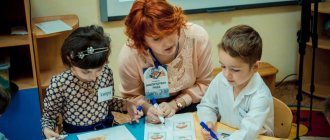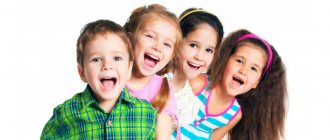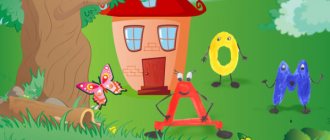Preparatory group. Senior preschool age. Children 6-7 years old
Work plan for self-education “Education of moral qualities of children of senior preschool age” Full name: Nadezhda Anatolyevna Berezina Specialty: educator Place of work: MBDOO Kizner kindergarten No. 6 “Italmas”
Experience: 24 years Education: Higher pedagogical Start date of work on the topic: 2021 academic year End date of work: 2020 academic year Topic on
self-education :...
Work plan on self-education “Creating conditions for the development of coherent speech in children of senior preschool age” “Creating conditions for development of coherent speech in children of senior preschool age" Goal: Improving professional qualifications on the development of the speech system in children of senior preschool age. Objectives: • improve the dialogical form of speech, • develop...
Self-education plan “Connected speech in the preparatory group”
Academic year: 2017-2018
Relevance.
By the beginning of school, a child must master the entire system of his native language, that is, by the age of seven he must have a sufficient level of development of vocabulary, grammatical structure of speech, phonetic-phonemic side of language activity, coherent dialogical and monologue speech.
Full command of the native language in preschool age is a necessary condition for solving the problems of mental, aesthetic and moral education of children in the most sensitive period of development.
At preschool age, the child masters, first of all, dialogical speech, which has its own specific characteristics, manifested in the use of linguistic means, which is built according to the laws of the literary language. Only special speech education allows a child to master coherent monologue speech, which is an expanded statement consisting of several sentences, divided according to the functional-semantic type into description, narration, and reasoning.
The development of coherent speech is realized through various organizational forms of work: classes (individual, subgroup, group), games (educational, generalizing, cognitive, developmental, productive, communicative, creative, subject, plot, role-playing, verbal and active, etc.) integrated classes.
The formation of coherent speech, the development of the ability to construct a statement meaningfully and logically is one of the main tasks of a child’s speech development.
Target:
increasing your theoretical level, professional skills and competence.
Tasks:
development of free communication with adults;
– improve the dialogical form of speech.
-develop a monologue form of speech;
– learn to retell short tales and stories coherently, consistently and expressively;
– teach (according to a plan and model) to talk about the subject, the content of the plot picture; compose a story based on pictures with sequentially developing events;
– develop the ability to compose your own stories from personal experience.
Self-education plan for the 2017-2018 academic year.
| Month | Subject | The content of the work | Practical solution |
| September October | "Development of coherent speech in the preparatory group" | Selection and study of literature on the topic; didactic games and exercises; plot paintings. | Information stand for parents “Child’s speech as a means of communication” |
| November | Speech development using didactic games. | Clarifying knowledge about activating and enriching children's vocabulary through didactic games. | Consultation for parents on the topic: "Didactic game as a means of connected speech." Card index of didactic games for studying with children Sharing experience with colleagues. Showing a lesson for parents. (11/17/2017) GCD on the topic “Family” |
| December | The influence of Russian folk tales on the development of coherent speech in preschool children | Teaching children to listen carefully to the teacher; see and highlight the positive and negative features of fairy tales and the heroes of these fairy tales; learn to answer the teacher’s questions about the content of the fairy tale. Help children imagine their own position in choosing the method of implementing actions, the image of a literary character; encourage the ability to expressively convey emotional states in facial expressions and movements; develop the ability to compose verbal descriptions based on the perception of pantomimic sketches; activate phraseological units in speech. | Consultation for preschool teachers “Fairytale therapy” in speech development classes.” Creation of a homemade book by children and a teacher based on Russian folk tales. |
| January | Games and exercises for the development of speech in children of senior preschool age. | Improve speech hearing, consolidate the skills of clear, correct, expressive speech. Differentiation of sounds, words, sentences. Practice tempo, voice strength, diction. | Offer parents a card index of games for the development of connected speech: “Find a place for the picture” "Good bad" “Where is the beginning of the story?” |
| February | Work on compiling stories based on plot paintings. | Teach children to look at a picture and highlight its main characteristics; teach children to do research when looking at a picture; form analysis, synthesis; teach children to compose a coherent story based on the picture based on the teacher’s example. Replenish and activate children's vocabulary. | Conversations with parents about the important role children’s stories from personal experience play in the development of coherent speech, and how important it is to listen patiently and carefully to the child when he shares his impressions with you. |
| March | Development of coherent speech through theatrical activities. | Studying methodological literature about theatrical activities in kindergarten, developing children’s creative independence, developing expressiveness in speech; develop the creative abilities of preschool children. | Showing a fairy tale for children of the younger group. "Swan geese " |
| April | Joint creativity of children and parents | Development of creative independence, aesthetic taste, image transmission; Development of emotional speech. Unlocking children's creative abilities. | Family competition “Make a riddle - draw a solution.” |
| May | Preparing for summer health work. | Teach children to compose a fairy tale using a model - diagram; tell each other your fairy tales consistently and coherently; learn to come up with a title for a fairy tale; work on the dictionary - learn to select attributes of objects (adjectives to nouns); cultivate interest in fairy tales and their writing. | Studying methodological and fiction literature, as well as Internet resources on the topics: “Summer”, “Russian folk tales” |
List of used literature:
1. Bazik I. Ya. Development of the ability for visual spatial modeling when familiarizing children of senior preschool age since 1986.
2. Vachkov I.V. Fairy tale therapy: Development of self-awareness through a psychological fairy tale. M. 2001.
3. Lapteva G.V. Games for the development of emotions and creativity. Theater classes for children aged 5 – 9 years. – St. Petersburg. speech; M. Sfera, 2011.
4. Lebedeva L.V. Kozina I.V. Kulakova T.V. et al. Lesson notes on teaching children retelling using support diagrams. Senior group. Educational and methodological manual. – M. Center for Teacher Education. 2009.
5. Shorokhova O. A. Playing a fairy tale. Fairytale therapy and classes for the development of coherent speech in preschoolers. – M. Sphere shopping center. 2007.
6. Ushakova O. S. Program for the development of speech for preschool children in kindergarten. M. 1994.
7. Ushakova O. S. Development of speech and creativity of preschool children. Games, exercises, lesson notes. – M. TC Sfera, 2007.
8. Ushakova O. S. Gavrish N. V. Introducing preschoolers to fiction: Lesson notes. M, 1998.
Work plan for self-education in a preschool group on the topic: “Development of coherent speech”
| April - | Continue work on developing children’s coherent speech: carry out breathing and articulation exercises. Play didactic, active, musical, round dance, theatrical games that took place in previous months. | Conversations with parents: “The role of descriptive stories in expanding children’s vocabulary.” |
| May | Continue to retell and compose stories and fairy tales. Continue to conduct consultations and individual conversations for parents. | Showing the fairy tale “Teremok” to children of the middle group. |
Used Books:
1. Alekseeva M.M., Ushakova O.S. Interrelation of tasks of speech development of children in the classroom // Education of mental activity in preschool children. - M, 2003. - p.27-43.
2. Anishchenkova E.S. Finger gymnastics for the development of speech in preschoolers. – AST, 2011. – 64 p.
3. Anishchenkova E.S. Speech gymnastics for the development of speech in preschoolers. – Profizdat, 2007. – 62 p.
4. Boguslavskaya Z.M., Smirnova E.O. Educational games for preschool children. – M.: Education, 2004. – 213 p.
5. Bondarenko A.K. Didactic games in kindergarten: A manual for kindergarten teachers. - M.: Education, 2005. - 160 p.
6. Boyko E.A. We learn to build sentences and tell stories. Simple exercises for the development of speech in preschoolers. – Ripol Classic, 2011. – 256 p.
7. Borodich A.M. Methods of speech development for preschool children. - M.: Education, 2004. - 255 p.
8. Raising children through play / Compiled by A.K. Bondarenko, A.I. Matusik. – M.: Education, 2003. – 136 p.
9. Gerbova V.V. Working with plot paintings // Preschool education - 2005. - N 1. - p. 18-23.
10. Gerbova V.V. Speech development in kindergarten // Library “Programs for education and training in kindergarten”. – Mosaic-Synthesis, 2010. – 56 p.
11. Gerbova V.V. Composing descriptive stories // Preschool education. - 2006. - N 9. - p. 28-34.
12. Elkina N.V. Formation of speech coherence in children of senior preschool age: Author's abstract. dis... cand. ped. Sci. - M, 2004. - 107 p.
13. Ershova E.B. We speak correctly. Games and tasks for speech development in preschoolers // Speech therapist lessons. – Astrel, 2011. – 64 p.
14. Kosinova E.M. Gymnastics for speech development. – M.: Eksmo LLC, 2003.
15. Tikheyeva E.I. Children's speech development. / Ed. F. Sokhina. - M.: Education, 2005. - 159 p.
16. Ushakova O.S. Work on the development of coherent speech in kindergarten (senior and preparatory groups for school) // Preschool education, 2004. - N 11. - p. 8-12.
17. Shukeylo V.A. 90 exercises for the development of speech in preschoolers // Getting ready for school. – Litera, 2009. – 96 p.
Self-education plan.
Municipal budget preschool institution
"Kindergarten "Zvezdochka"
Self-education plan
“Introducing children of senior preschool age to folk arts and crafts”
Teacher Dyubanova Svetlana Viktorovna
Roslavl, Smolensk region.
2017-2018 academic year
Target:
Improve professional qualifications on the development of children's artistic abilities.
Expand knowledge about folk crafts
To strengthen children’s skills when composing a decorative composition based on one or another folk art, using its characteristic pattern elements and color scheme.
To instill in children a love for Russian arts and crafts and respect for the work of folk craftsmen.
Tasks:
Study educational, reference, scientific and methodological literature on the issue of folk crafts of Russia;
Learn to model work based on studied types, techniques and methods;
Systematize the studied literature.
Relevance
Folk arts and crafts is one of the means of education that teaches us to see and understand the beauty in the life around us, in the fine arts. The relevance is due to the great importance of educating moral and patriotic feelings among preschoolers in modern society, the development of cognitive interests and creative abilities of children. The provisions of the Federal State Educational Institution for Education clearly outline the task of forming patriotism, citizenship, and morality, and this is only possible under the condition of the active use of works of art as a means and condition for the harmonious development of the child. Through communication with folk art, the child’s soul is enriched and a love for his native land is instilled.
Forms and methods of work:
Conducting thematic classes,
Design of a series of exhibitions for children on Russian folk crafts.
Making folk toys, crafts, drawings.
Selection of visual teaching aids and demonstration material.
Drawing up a long-term plan, developing notes, creating a developmental environment.
Conducting classes and conversations (frontal, subgroup, individual).
Excursion to the city art school, to the local history museum.
Meetings with interesting people.
Exhibition of children's drawings based on folk paintings, “Do-it-yourself folk toys.”
Memorizing poems, riddles about folk crafts.
Studying the program by age groups of children.
Working with methodological literature
Assistance in holding autumn matinees: making costumes, attributes, playing roles.
Processing of personal data.
Preparation and execution of documentation.


